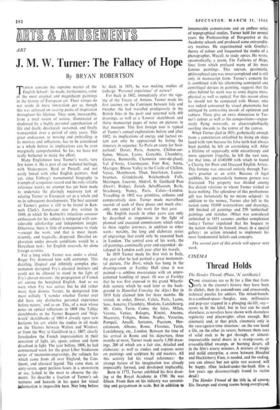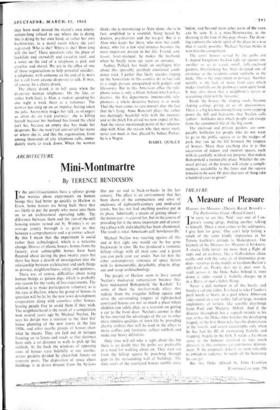CINEMA
Thread Holds
The Slender Thread. (Plaza, 'A' certificate.) SOME situations are so fit for a film that from early in the cinema's history they have been its clichés, then its conundrums and crosswords, technical puzzles for addicts. The mixed-bunch- in-a-confined-space—burglar, nun, millionaire and pop-star trapped in a plunging ski-lift, say— seems to fit the label, but in fact can be used elsewhere, as novelists have shown with shameless regularity and playwrights often enough. But cinematic and, at that pitch, cinematic only is the race-against-time situation: on the one hand a life, on the other its savers, between them tons of solid rock to be got through, or almost- impenetrable metal doors in a strong-room, or crocodile-filled swamps, or burning desert, all in the film's ninety minutes. A mixture of magic and stolid enterprise, a cross between Houdini and Huckleberry Finn, is needed, and the ending, you can almost but not quite rest assured, will be happy. (One locked-under-the-bank film a few years ago disconcertingly found its victim dead.) The Slender Thread of the title is, of course, life. Swamps and strong rooms being overplayed,
they have used instead the victim's own ninety- minute-long refusal to say where she is dying. She is dying by her own hand, or rather her own barbiturates, in .a motel room where she isn't registered. Who is she? Where is she? How long will she last? These questions take the place of landslide and snowdrift and caved-in roof. and a voice on the end of a telephone is pick and crowbar and shovel. We are in the office of one of those organisations to help potential suicides: a telephone, with someone on the end of it. waits for a call from anyone desperate to talk. It may, of course, be a chatty drunk.
The chatty drunk is in full spate when the desperate woman telephones. On the line, or rather both lines, is Alan. a student spending his one night a week there as a volunteer. The woman has rung up on an impulse, having taken the pills. Anonymity makes her talk, as strangers so often do on train journeys: she is killing herself because her husband has found the child isn't his, because an empty day has made her desperate. But she won't (of course) tell her name or where she is, and this the organisation, from among thousands of city telephone calls, imme- diately starts to track down. When the woman thinks She is murmuring to Alan alone, she is in fact, amplified to a roomful, being heard by doctors, psychiatrists and the tea-girl. But it is Alan who keeps her there, who wins her confi- dence, who for a few vital minutes becomes the most important person in her life. Friend, con- fessor. lover-manqta5, he makes the husband, when he finally turns up, seem an outsider.
Sydney Pollack has made an intelligent film about this (possibly justified) emotional confi- dence trick. I gather that likely suicides ringing up the Samaritans in this country do in fact talk to a single person, unequipped with gadgets and life-savers. But in this American office the tele- phone voice is only a blind, behind which police. doctors, the tire department. innumerable tele- phonists. a whole detective battery is at work. That the man comes to care doesn't alter the fact that he's lying. Anne Bancroft plays the rather too dazzingly beautiful wife with the intensit■ and at the pitch I'm afraid we now expect of her. And the (never-mentioned) point of her relation- ship with Alan. the reason why they never meet, never ran meet, is that, played by Sidney Pottier, he is a Negro.
ISABEL QU kiLY







































 Previous page
Previous page